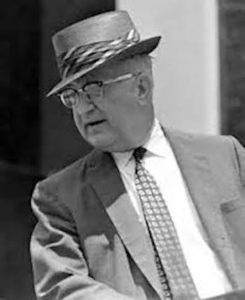
Bull Connor
*'Bull' Connor was born on this date in 1897. He was a white-American politician who served as the Commissioner of Public Safety for Birmingham, Alabama, for over two decades.
Theophilus Eugene 'Bull' Connor was born in Selma, Alabama, the son of Molly (Godwin) and Hugh King Connor, a train dispatcher and telegraph operator. He entered politics as a Democrat in 1934, winning a seat in the Alabama House of Representatives. As a legislator, he supported populist measures and pro-union issues for white people. He voted for extending the poll tax, which served as voter suppression of poor Blacks and whites, and against an anti-sedition bill intended to stifle union activity.
In 1936, he did not stand for a second term, instead running for Commissioner of Public Safety for the City of Birmingham. Concurrently, during this period, Connor served as the radio play-by-play broadcaster of the minor league Birmingham Barons baseball club for four seasons. Willie Mays remembered listening to him call games: "Pretty good announcer, too, although I think he used to get too excited."
He strongly opposed the American Civil Rights Movement in the 1960s. Under the city commission government, Connor was responsible for administrative oversight of the Birmingham Fire Department and the Birmingham Police Department, which also had their own chiefs. Bull Connor enforced Jim Crow legal racial segregation, especially during 1963's Birmingham campaign, led by the Southern Christian Leadership Conference. His brutality and violence against civil rights activists contributed to the Ku Klux Klan and other violence against blacks in Birmingham.
On a Sunday in September 1963, the 16th Street Baptist Church bombing destroyed a portion of the church basement, causing four Black girls to die. The church was known as the center of civil rights activities in Birmingham. The city and movement leaders had just agreed to integrate facilities and jobs. The deaths of the children prompted Attorney General Robert Kennedy to call Governor George Wallace and threaten to send in federal troops to control violence and bombings in Birmingham.
He became an international symbol of institutional racism and police brutality, mainly due to his directing the widespread use of fire hoses and police attack dogs against civil rights activists, including against children supporting the protests. National media broadcast these tactics on television. The outrages served as catalysts for significant social and legal change in the Southern United States. They contributed to the passage by the United States Congress of the Civil Rights Act of 1964. On June 3, 1964, Connor resumed his position in government when he was elected President of the Alabama Public Service Commission.
He suffered a stroke in 1966 and used a wheelchair for the rest of his life. Months later, Connor won another term but was defeated in 1972. He suffered another stroke on February 26, 1973, which left him unconscious. He died on March 10, 1973. Connor is mentioned in contemporary folk singer Phil Ochs's 1965 song "Talking Birmingham Jam." Spike Lee's documentary 4 Little Girls (1997) includes footage of Connor and interviews with people describing police tactics during his tenure. Footage of Connor also appears in the 1999 film Our Friend, Martin, and Connor is cited by name in the 2014 film Selma.